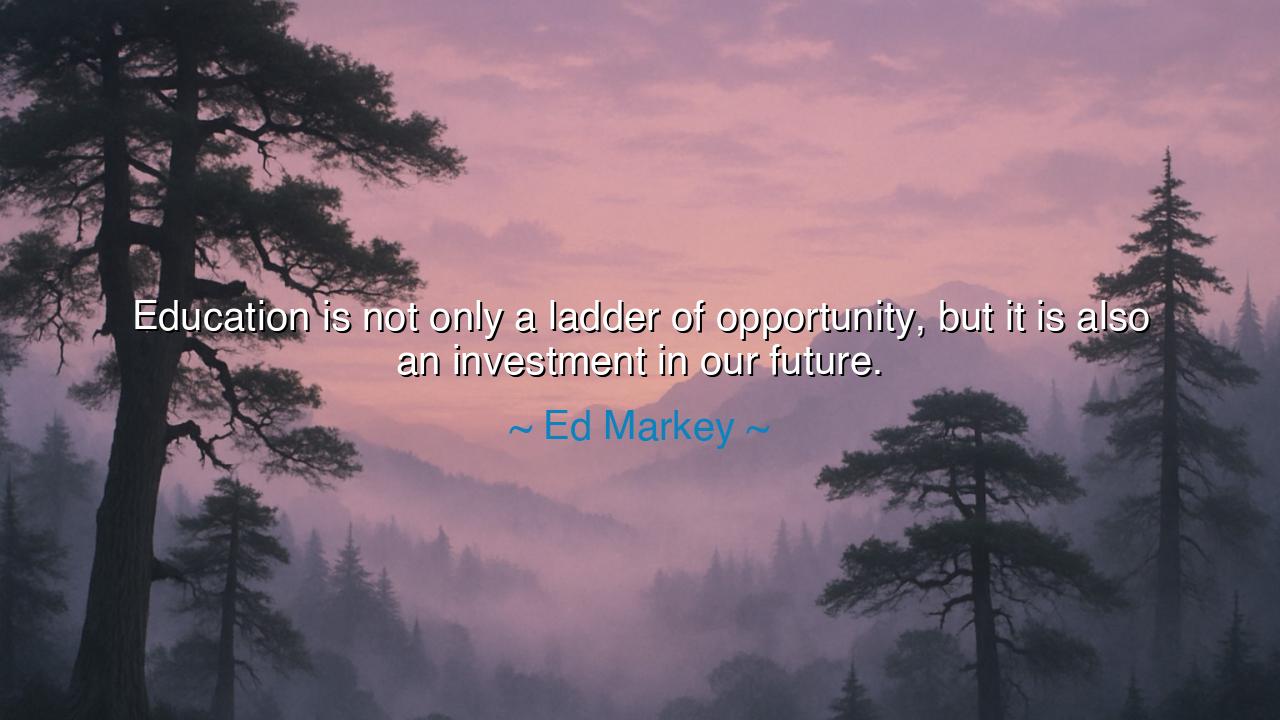
Education is not only a ladder of opportunity, but it is also an
Education is not only a ladder of opportunity, but it is also an investment in our future.






In the profound words of Ed Markey, “Education is not only a ladder of opportunity, but it is also an investment in our future,” we are reminded of the transformative power that education has in shaping not only individual lives but entire societies. Markey speaks to the deep and lasting impact of learning—how it provides the tools to rise above present circumstances, and how it nurtures the seeds of progress for generations to come. Education, as he suggests, is not merely a means to an end, but a fundamental investment in the possibilities of tomorrow. It is an enduring force that propels us forward, like a river carving its path through stone, shaping both our individual destinies and the course of human civilization.
The concept of education as an investment in the future is rooted in the wisdom of the ancients. Plato, in his work The Republic, famously described education as the means by which individuals become virtuous, wise, and capable of leading society. Plato believed that the proper education would not only elevate the individual but uplift society as a whole. He spoke of the philosopher-king, a ruler educated in the ways of truth, justice, and wisdom, capable of guiding the city-state toward prosperity. Just as Plato understood that the future of a society depends on the education of its people, Markey underscores the idea that an investment in education today is the key to the opportunities of tomorrow.
Consider the life of Aristotle, Plato's greatest student, who devoted his life to the study of nature, philosophy, and human beings. Aristotle believed that education was the path to human flourishing and the foundation upon which the best of humanity could be built. His teachings shaped not only the Greek world but became the cornerstone for the development of Western thought. By investing in his own education, Aristotle contributed not only to his own life but to the future of philosophy, science, and political theory. His commitment to lifelong learning serves as a testament to the belief that education is a powerful tool for progress, both for the individual and for society.
Ed Markey’s assertion that education is a ladder of opportunity aligns with the vision of Confucius, who believed that learning was the path to both personal growth and societal harmony. Confucius saw education as the means through which an individual could cultivate virtue, develop self-discipline, and contribute to the well-being of society. He emphasized that education was not solely for the elite, but should be accessible to all, for it is through the education of the masses that a nation thrives. Just as Markey suggests, Confucius knew that learning empowers individuals to rise above their circumstances and become agents of positive change in the world.
The lesson that education is an investment in the future is further exemplified by the journey of Abraham Lincoln, who rose from humble beginnings with very little formal education. However, Lincoln’s dedication to learning, reading anything he could get his hands on, allowed him to become one of the greatest presidents in American history. His self-education in law, leadership, and moral philosophy was the key to his ability to navigate the country through its greatest crisis. Lincoln’s story underscores the idea that education is not simply a path to personal achievement, but an investment in the future of society. It is through education that we prepare ourselves to lead, to make informed decisions, and to contribute meaningfully to the world.
The lesson of Markey’s quote is a call to action for each generation: to value education as more than a means of acquiring knowledge or skills, but as a vital investment in the future. We must understand that the opportunities we create today through education will determine the potential of those who come after us. Education is the foundation upon which societies are built, and its impact can ripple out for centuries. Whether it is through formal education, self-teaching, or mentorship, we are responsible for ensuring that knowledge is passed on and that each individual has the opportunity to grow and contribute to the greater good.
In practical terms, we can take Markey’s message to heart by prioritizing education in all aspects of our lives. We must encourage the young to pursue their dreams, to invest in learning, and to expand their horizons. But education is not just for the young—lifelong learning is just as important for adults who seek to continue growing and adapting to a changing world. We must also support educational systems that are accessible to all, recognizing that knowledge is the greatest gift we can give to future generations. Let us invest in education as a means to shape a better future, to provide opportunity, and to leave a legacy that uplifts and empowers. For it is through the growth of minds, the development of virtue, and the cultivation of wisdom that we lay the groundwork for a prosperous and just world.






AAdministratorAdministrator
Welcome, honored guests. Please leave a comment, we will respond soon